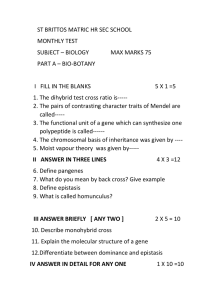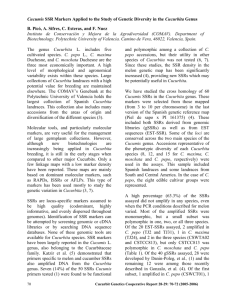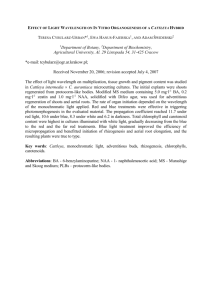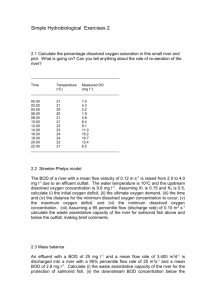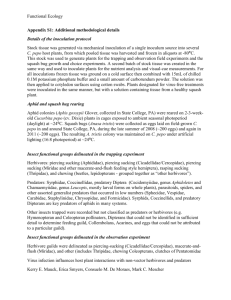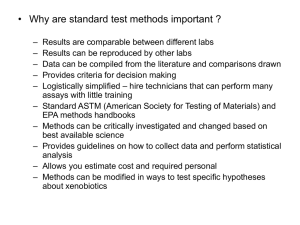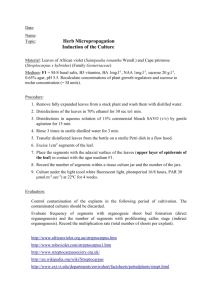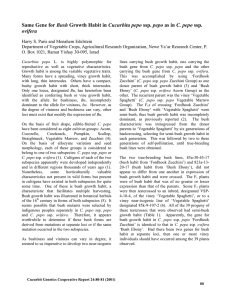Cucurbita pepo
advertisement
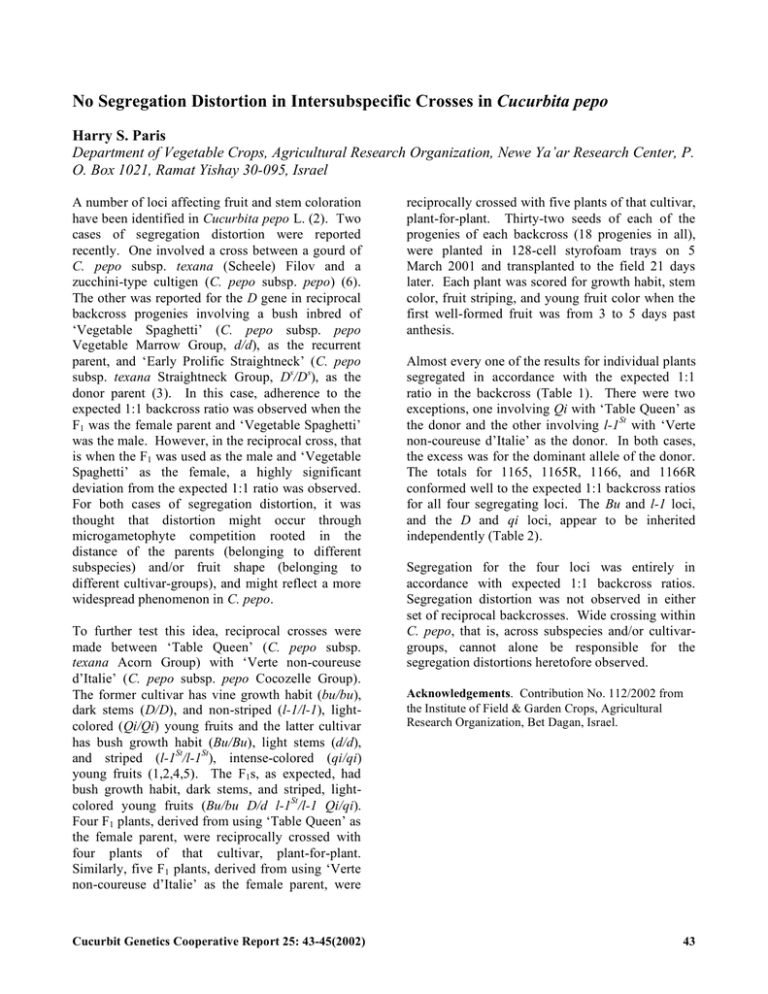
No Segregation Distortion in Intersubspecific Crosses in Cucurbita pepo Harry S. Paris Department of Vegetable Crops, Agricultural Research Organization, Newe Ya’ar Research Center, P. O. Box 1021, Ramat Yishay 30-095, Israel A number of loci affecting fruit and stem coloration have been identified in Cucurbita pepo L. (2). Two cases of segregation distortion were reported recently. One involved a cross between a gourd of C. pepo subsp. texana (Scheele) Filov and a zucchini-type cultigen (C. pepo subsp. pepo) (6). The other was reported for the D gene in reciprocal backcross progenies involving a bush inbred of ‘Vegetable Spaghetti’ (C. pepo subsp. pepo Vegetable Marrow Group, d/d), as the recurrent parent, and ‘Early Prolific Straightneck’ (C. pepo subsp. texana Straightneck Group, Ds/Ds), as the donor parent (3). In this case, adherence to the expected 1:1 backcross ratio was observed when the F1 was the female parent and ‘Vegetable Spaghetti’ was the male. However, in the reciprocal cross, that is when the F1 was used as the male and ‘Vegetable Spaghetti’ as the female, a highly significant deviation from the expected 1:1 ratio was observed. For both cases of segregation distortion, it was thought that distortion might occur through microgametophyte competition rooted in the distance of the parents (belonging to different subspecies) and/or fruit shape (belonging to different cultivar-groups), and might reflect a more widespread phenomenon in C. pepo. To further test this idea, reciprocal crosses were made between ‘Table Queen’ (C. pepo subsp. texana Acorn Group) with ‘Verte non-coureuse d’Italie’ (C. pepo subsp. pepo Cocozelle Group). The former cultivar has vine growth habit (bu/bu), dark stems (D/D), and non-striped (l-1/l-1), lightcolored (Qi/Qi) young fruits and the latter cultivar has bush growth habit (Bu/Bu), light stems (d/d), and striped (l-1St/l-1St), intense-colored (qi/qi) young fruits (1,2,4,5). The F1s, as expected, had bush growth habit, dark stems, and striped, lightcolored young fruits (Bu/bu D/d l-1St/l-1 Qi/qi). Four F1 plants, derived from using ‘Table Queen’ as the female parent, were reciprocally crossed with four plants of that cultivar, plant-for-plant. Similarly, five F1 plants, derived from using ‘Verte non-coureuse d’Italie’ as the female parent, were Cucurbit Genetics Cooperative Report 25: 43-45(2002) reciprocally crossed with five plants of that cultivar, plant-for-plant. Thirty-two seeds of each of the progenies of each backcross (18 progenies in all), were planted in 128-cell styrofoam trays on 5 March 2001 and transplanted to the field 21 days later. Each plant was scored for growth habit, stem color, fruit striping, and young fruit color when the first well-formed fruit was from 3 to 5 days past anthesis. Almost every one of the results for individual plants segregated in accordance with the expected 1:1 ratio in the backcross (Table 1). There were two exceptions, one involving Qi with ‘Table Queen’ as the donor and the other involving l-1St with ‘Verte non-coureuse d’Italie’ as the donor. In both cases, the excess was for the dominant allele of the donor. The totals for 1165, 1165R, 1166, and 1166R conformed well to the expected 1:1 backcross ratios for all four segregating loci. The Bu and l-1 loci, and the D and qi loci, appear to be inherited independently (Table 2). Segregation for the four loci was entirely in accordance with expected 1:1 backcross ratios. Segregation distortion was not observed in either set of reciprocal backcrosses. Wide crossing within C. pepo, that is, across subspecies and/or cultivargroups, cannot alone be responsible for the segregation distortions heretofore observed. Acknowledgements. Contribution No. 112/2002 from the Institute of Field & Garden Crops, Agricultural Research Organization, Bet Dagan, Israel. 43 Table 1. Segregation for stem color, growth habit, fruit striping, and young fruit color in backcrosses involving ‘Table Queen’ (TQE, C. pepo subsp. Texana Acoprn Group, genotype bu.bu D/D l-l-1 Qi/Qi) and ‘Verte non-coureuse d’Italie’ (VNI, C. pepo subsp. Pepo cocozelle Group, genotype bu/Bu d/d l-1St-/l-1St qi/qi). __________________________________________________________________________________ Number of plants Number of plants D/d d/d X2 P Qi/qi qi/qi X2 P 1165 1165a 1165b 1165c Total 19 15 17 13 64 11 17 15 18 61 2.133 0.125 0.125 0.806 0.036 0.15 0.72 0.72 0.37 0.85 13 19 19 21 72 17 13 13 10 53 0.533 1.125 1.125 6.903 2.888 0.46 0.28 0.04 0.08 1165R 1165Ra 1165Rb 1165Rc Total 19 15 14 14 62 10 15 18 15 5 2.793 0.000 0.500 0.034 0.133 0.09 1.00 0.47 0.85 0.71 17 16 16 14 63 12 14 16 15 57 0.431 0.133 0.000 0.034 0.300 0.50 0.71 1.00 0.85 0.58 Line* Bu/Bu bu/bu X2 P l-1St/l-1 l-1/l-1 X2 P 1166 1166a 1166b 1166c 1166d Total 16 17 19 17 16 85 15 14 12 14 16 71 0.032 0.290 1.581 0.290 0.000 1.256 0.85 0.58 0.21 0.58 1.00 0.26 13 19 14 13 18 77 18 12 17 18 14 79 0.806 1.581 0.290 0.806 0.500 0.026 0.37 0.21 0.58 0.37 0.47 0.86 1166R 1166Ra 1166Rb 1166Re 1166Rd Total 17 13 18 14 13 75 14 17 13 18 14 76 0.290 0.533 0.806 0.500 0.037 0.007 0.58 0.46 0.37 0.47 0.85 0.93 14 13 15 16 19 77 17 17 16 16 8 74 0.290 0.533 0.032 0.000 4.481 0.060 0.58 0.46 0.85 1.00 0.03 0.80 Line* *The 1165 lines employed TQE as donor parent and VNI as recurrent parent. The 1166 lines employed VNI as donor parent as TQE as recurrent parent. Lines designated R were derived using the F1 as female and recurrent parent as male; lines not designated R were derived using the F1 as male and recurrent parent as female. Cucurbit Genetics Cooperative Report 25: 43-45(2002) 44 Table 2. Breakdown into four genotypes in the mutual, reciprocal backcrosses of Table Queenm (TQE,C. pepo subsp. Texana Acorn Group, genotype bu/bu D/D l-1 Qi/Qi) and Verte non-coureuse d’Italie (VNI, C. pepo subsp. Pepo Cocozelle Grop, genotype Bu/Bu d/d l-1St/l-1St qi/qi). Female Parent VNI F1 Total Female Parent TQE F1 Total Male Parent F1 VNI Total Total 125 120 245 Male Parent Total F1 TQE Total 156 151 307 Number of plants D/d D/d d/d Qi/qi Qi/qi Qi/qi 34 35 69 30 27 57 38 28 66 23 30 53 Number of plants Bu/bu Bu/bu bu/bu St l-1 /l-1 l-1/l-1 l-1St/l-1 38 38 76 47 47 84 d/d qi/qi 39 39 78 bu/bu l-1/l-1 32 37 69 X2 P 3.928 1.267 2.755 0.26 0.73 0.44 X2 P 2.923 0.065 1.495 0.42 0.99 0.68 Literature Cited 1. Denna, D.W. and H.M. Munger. 1963. Morphology of the bush and vine habits and the allelism of the bush genes in Cucurbita maxima and C. pepo squash. Proc. Amer. Soc. Hort. Sci. 82: 370-377. Eucarpia Meeting on Cucurbit Genetics and Breeding. Acta Hort. 510: 199-202. 4. Paris, H.S. and Y. Burger. 1989. Complementary genes for fruit striping in summer squash. J. Hered. 80: 490-493. 2. Paris, H.S. 2000. Quiescent intense (qi): a gene that affects young but not mature fruit color intensity in Cucurbita pepo. J. Hered. 91: 333339. 5. Paris, H.S. and H. Nerson. 1986. Genes for intense pigmentation of squash. J. Hered. 77: 403-409. 3. Paris, H.S. 2000. Segregation distortion in Cucurbita pepo, in: N. Katzir and H.S. Paris, eds., Proceedings of Cucurbitaceae 2000, the 7th 6. Wilson, H.D. and J.S. Payne. 1994. Crop/weed microgametophyte competition in Cucurbita pepo. Amer. J. Bot. 81: 1531-1537. Cucurbit Genetics Cooperative Report 25: 43-45(2002) 45
